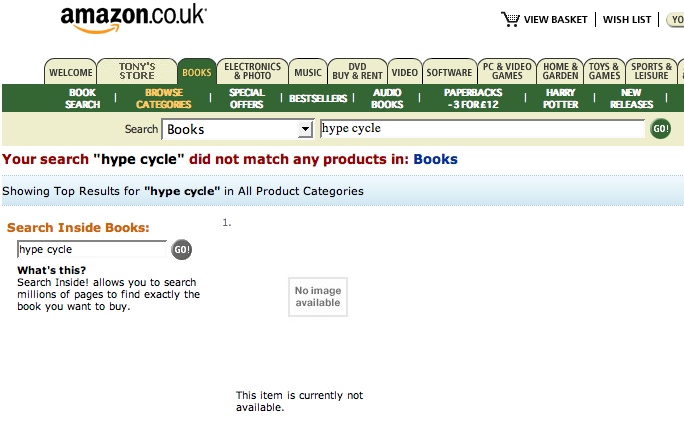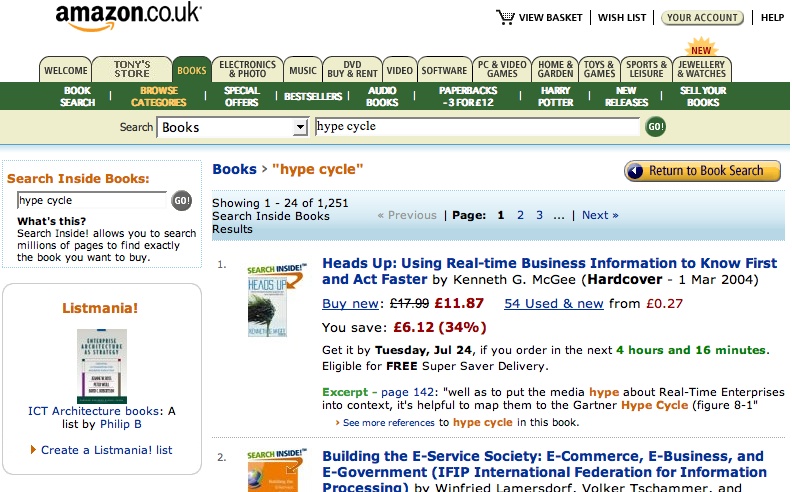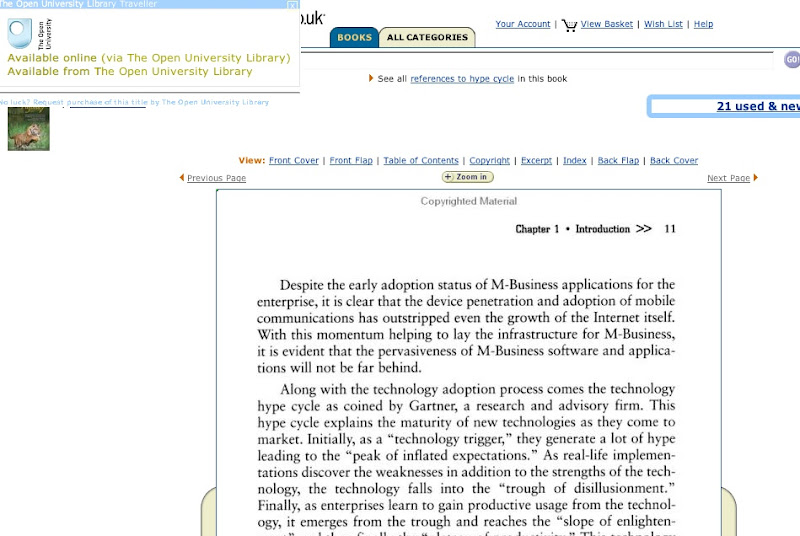July 23, 2007
Deep Linking 2.0 - What Counts as Fair Use of Online Book Extracts?
When I first started writing online educational materials, I was told that deep linking was out - if we wanted to reference a page several clicks down into a site, we had to provide instructions on how to find that page from the front page, which was (supposedly) the only place we could link to.
Times are a little more enlightened now, but still there are bottlenecks in place, and for good financial (and fair use) reasons.
Just now, I tried a search on Amazon - in the books section - on hype cycle - no hits:
there was the option to search inside books though, which was far more promising:
From these results, I can click through to the actual page on which the search term appears:
(The panel in the top left is the OU Library Traveller panel, which appears on pages that have ISBNs in the URL from a selection of bookselling and bookrelated websites. The panel looks up books with that ISBN (and alternative editions via xISBN) in the OU Library, both hard copy and ebook versions, and displays its availability. The script is easily customisable to many other library systems.)
As a heavy Amazon user, this ability to search through books and pull out content (as well as maybe buying the book) is a Good Thing. (Funnily enough, I don't tend to use Google books to do this much...)
But what struck me just now was that this supports exactly the way I use a great many academic/technical books - to look up particular items on maybe one or two pages.
The next thought was: can I link to an open book page on Amazon and share that link? Answer: I don't think I can (though maybe I could on Google books) - I think I need to be logged in on my Amazon account?
The next thought: if I could deep link to an open book page, could I put that link in my course materials? That is, would the deep link be a fair use of the resource being linked to? The corollary I'd like to imagine in the real world is a 2 page photocopied handout for the students on a course.
Next thought: OU courses are password/paywall (i.e. student registration required) protected - so the use is limited (and hopefully justified under educational terms). Bit what about putting such a link in OpenLearn, where there is no restriction on access? Still fair?
Back behind the paywall, and could we "borrow" the Amazon embed code to display the two pages of text in the body of OUr materials, as we could with material posted on Scribd for example?
And so it goes on...
The main question is - can I fairly, in password protected online educational materials, link to (or even better, embed) one/two page snippets of online scanned book content? Because often one or two pages is all I need?
Or would we have to license the content and pay a special page charge for it? (Obviously, we'd have to pay for larger chunks, for example at chapter level: Buy By the Chapter).
PS here's something else to chase, maybe? The Open Library (which is not the OU Library...):
The Open Library website was created by the Internet Archive to demonstrate a way that books can be represented online.Posted by ajh59 at July 23, 2007 02:25 PMThe vision is to create free web access to important book collections from around the world.
Books are scanned and then offered in an easy-to-use interface for free reading online. If they're in the public domain, the books can be downloaded, shared and printed for free. They can also be printed for a nominal fee by a third party, who will bind and mail the book to you. The books are always FREE to read at the Open Library website.
Rather than deep linking, you could maybe scan the relevant pages of the book under the CLA HE Trial Scanning licence, to make them available to registered students on your course... provided that you have the book in print, in stock at your institution, and it is from a UK publisher, all other terms of the licence are met, and of course provided that the OU has paid for the licence... not a particularly simple or comprehensive approach, I know!
The US approach would be to use the CCC - Copyright Clearance Center web page to find out how much it would cost to scan the text and make it available to your students on a per page, per student basis.
There is no blanket licence for copying from born digital content, although I believe that some publishers do grant such copying in some subscription arrangements, so you might want to look into those.
I'm not sure how easy it would be to link to a single page of a book, even if it were something that you had paid for your students to have access to electronically. When we reference electronic books that we have bought we link to the library catalogue record, from where we link to the book. The library catalogue links are the ones we keep up to date, and they also give directions about how to log in to subscription databases. I am not aware of a deep linking mechanism for e-books to link within a book's content.
If each chapter of an e-book were to have a DOI then deep linking at chapter level might become possible.
It is possible to link to journal articles directly, using the OpenURL structure. It is far better to use the DOI if you have one though (many e-journal publishers use these at article level nowadays), because publishers merge and go out of business, so the content moves from one domain to another. Or use your institution's OpenURL resolver, so that your link performs a lookup on your institution's subscriptions every time someone clicks on it: that's how our Build-a-Link tool works, in order to get round the need to know DOIs.
So ethical and legal issues aside, I'm not sure if it is technically possible to deep link to the content as you describe. Linking to free content on the Amazon website in the way you describe would revolutionise the way we provide access to electronic texts currently.
Posted by: Jenny Delasalle at July 24, 2007 11:39 AM"So ethical and legal issues aside, I'm not sure if it is technically possible to deep link to the content as you describe. Linking to free content on the Amazon website in the way you describe would revolutionise the way we provide access to electronic texts currently."
ah - you spotted the (not totally clear) point I intended to make when I started writing the post then?! ;-)
Thanks for the substantive comments - I need to go and digest them now... ( my knowledge of IPR issues is pretty weak...)
tony
Posted by: Tony Hirst at July 24, 2007 11:44 AM

